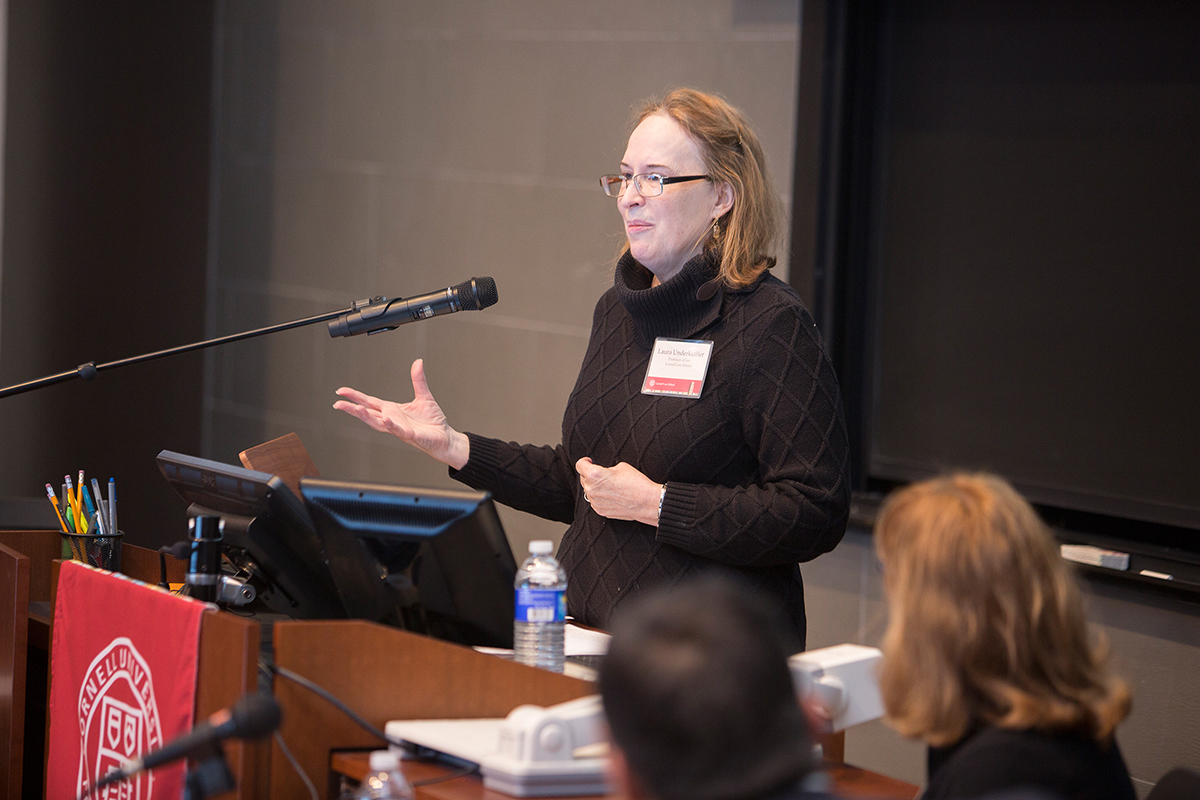Law School panel considers town-gown land use regulations
By Emily McNeil

A Feb. 26 Cornell Law School panel explored the ways in which college towns have used legal restrictions to control student behavior and preserve the integrity of their neighborhoods.
“College students have a significant impact on the residential life of their university’s cities, potentially leading to negative spill over that disrupts the local community,” said Sara Bronin at the panel, “How should college towns shape their land-use regulations to best meet student needs while promoting long-term community interests?” The panel was moderated by Cornell Law School Dean Eduardo Peñalver ’94.
“Towns are grappling with changes in demographics, living arrangements, and people’s preferences and trying to figure out how to define functional families,” said Bronin, a professor of law at the University of Connecticut and the chair of Hartford’s Planning and Zoning Commission.
Bronin examined the definition of “family” in local zoning ordinances, and described the way that some definitions of family could be interpreted to prevent groups of college students from living in certain residential areas. For example, she described how some municipalities restrict the definition of family to a certain number of people unrelated by blood or marriage. She also cited the example of municipalities choosing to include “functional families,” groups that live as a family longer term than college students, in their definitions of family. When adopting such provisions, Bronin said that municipalities can and often do carefully craft them to exclude college students from residential areas.
Jane Kolodinsky, a professor of community development and applied economics at the University of Vermont, discussed the informal and formal agreements between municipalities and universities to manage Burlington’s historic college town. One project, funded by the university and the city council, gave students off-campus survival guides, instructions on city laws and regulations “to continually improve and foster a quality relationship between UVM and the town of Burlington,” Kolodinsky said.
Another agreement, requiring the university to increase housing on a one-to-one basis with enrollment, led to the college engaging in 20-year contracts with private developers to manage new student buildings. Although these contracts appear beneficial in the short-term, Kolodinsky warned the wear and tear on the buildings would pose a problem once they are turned back over to the university.
Cornell law professor Laura Underkuffler discussed other approaches to control the negative effects students may have on college towns. Many universities, such as Duke and Notre Dame, are partnering with city administrations to buy properties in decaying neighborhoods, renovate them, and sell them to university staff. “This kind of solution is not going to solve the problem of the need for student rentals, but might have some ability to stabilize neighborhoods,” Underkluffer said.
As residential life changes and university enrollment grows, cities and universities will continue to experiment with land-use regulations and other agreements to foster harmony among student and local interests. With respect to accommodating competing interests in college towns, “there’s going to be a lot of work for future lawyers,” Kolodinsky joked.
Emily McNeil ’16 is a writer intern for the Cornell Chronicle.
Media Contact
Get Cornell news delivered right to your inbox.
Subscribe